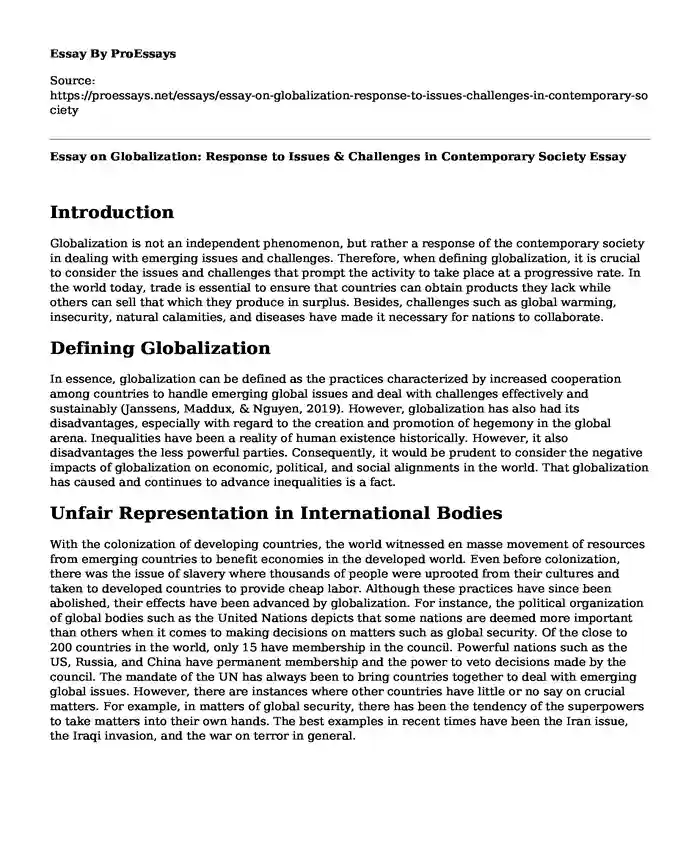Introduction
Globalization is not an independent phenomenon, but rather a response of the contemporary society in dealing with emerging issues and challenges. Therefore, when defining globalization, it is crucial to consider the issues and challenges that prompt the activity to take place at a progressive rate. In the world today, trade is essential to ensure that countries can obtain products they lack while others can sell that which they produce in surplus. Besides, challenges such as global warming, insecurity, natural calamities, and diseases have made it necessary for nations to collaborate.
Defining Globalization
In essence, globalization can be defined as the practices characterized by increased cooperation among countries to handle emerging global issues and deal with challenges effectively and sustainably (Janssens, Maddux, & Nguyen, 2019). However, globalization has also had its disadvantages, especially with regard to the creation and promotion of hegemony in the global arena. Inequalities have been a reality of human existence historically. However, it also disadvantages the less powerful parties. Consequently, it would be prudent to consider the negative impacts of globalization on economic, political, and social alignments in the world. That globalization has caused and continues to advance inequalities is a fact.
Unfair Representation in International Bodies
With the colonization of developing countries, the world witnessed en masse movement of resources from emerging countries to benefit economies in the developed world. Even before colonization, there was the issue of slavery where thousands of people were uprooted from their cultures and taken to developed countries to provide cheap labor. Although these practices have since been abolished, their effects have been advanced by globalization. For instance, the political organization of global bodies such as the United Nations depicts that some nations are deemed more important than others when it comes to making decisions on matters such as global security. Of the close to 200 countries in the world, only 15 have membership in the council. Powerful nations such as the US, Russia, and China have permanent membership and the power to veto decisions made by the council. The mandate of the UN has always been to bring countries together to deal with emerging global issues. However, there are instances where other countries have little or no say on crucial matters. For example, in matters of global security, there has been the tendency of the superpowers to take matters into their own hands. The best examples in recent times have been the Iran issue, the Iraqi invasion, and the war on terror in general.
Brain Drain
Developing countries are also faced with the economic challenge of brain drain. The fact that developed countries can offer better employment opportunities and better remuneration has led to the migration of essential skilled labor such as teachers and doctors. Therefore, developing countries continue to suffer due to a lack of essential services. The reason for the observation is that movement across borders by people has been made easier. However, there is little or no regulation on the movement of labor, and developing countries have been placed at a great disadvantage. Countries in the developed world sometimes spend resources to educate skilled labor and ensure that the provision of essential services is optimized. Therefore, when such skilled labor opts to work in rich countries, it becomes a huge loss.
Global Warming and Cultural Extinction
There is also the issue of global warming, where developing countries suffer most from a problem that was primarily caused by developing countries. The number of industries in the developed world is far greater in number and scale as compared to those in developing countries. Therefore, it is correct to assume that a large percentage of greenhouse gases originate from rich countries. However, the countries that suffer most are developing countries because they are unable to deal with climate change issues such as the droughts that threaten food security. Although the concept of carbon credit has been used to ensure equitable sharing of responsibilities when it comes to global warming, it has yet to create a level ground for all countries of the world. Globalization has also placed powerful countries at an unfair cultural advantage. For instance, colonization led to the cultural assimilation of most countries in developing countries. Therefore, aspects such as language and communication are still being influenced by rich countries. The major languages of communication globally are primarily from the developed world. In essence, there is the danger of extinction of cultures in developing countries.
Conclusion
These issues demonstrate that whereas globalization has created a platform for collaboration and discussion of global problems, it also has advanced inequalities that put poor countries at a disadvantage. Globalization is inherently a positive aspect. However, the way it has been handled has failed to create checks and balances to ensure that inequalities are eliminated. The economies of poor countries are stunted because even when it comes to a trade agreement, the rich countries often have the power to bargain for better conditions. Some states have continued to use donor funds and loans as a way to shift the balance in favor of developing countries. However, these solutions are not sustainable.
References
Janssens, M., Maddux, W. W., & Nguyen, T. (2019). Globalization: Current issues and future research directions. Negotiation and Conflict Management Research, 12(2), 174-185. Retrieved from http://willmaddux.web.unc.edu/files/2019/04/NCMR-Globalization.pdf
Cite this page
Essay on Globalization: Response to Issues & Challenges in Contemporary Society. (2023, Nov 19). Retrieved from https://proessays.net/essays/essay-on-globalization-response-to-issues-challenges-in-contemporary-society
If you are the original author of this essay and no longer wish to have it published on the ProEssays website, please click below to request its removal:
- Financial Markets and Monetary Policy
- Urban Heat Islands
- Harrison H. Schmitt and William Happer: In Defense of Carbon Dioxide
- The Cultural and Social Transformation of Cardiff Paper Example
- Wage Gap Between Men and Women - Essay Sample
- Essay Sample on Monopoly and Oligopoly Firms
- Essay Example on Public Health & Climate Change: Identifying Populations at Risk







